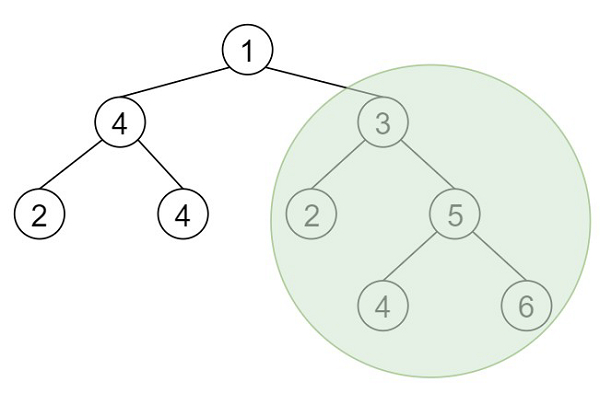
 Data Structure
Data Structure Networking
Networking RDBMS
RDBMS Operating System
Operating System Java
Java MS Excel
MS Excel iOS
iOS HTML
HTML CSS
CSS Android
Android Python
Python C Programming
C Programming C++
C++ C#
C# MongoDB
MongoDB MySQL
MySQL Javascript
Javascript PHP
PHP
- Selected Reading
- UPSC IAS Exams Notes
- Developer's Best Practices
- Questions and Answers
- Effective Resume Writing
- HR Interview Questions
- Computer Glossary
- Who is Who
Maximum Sum BST in Binary Tree in C++
Suppose we have a binary tree root, we have to find the maximum sum of all nodes of any subtree which is also a Binary Search Tree (BST).
So, if the input is like,

then the output will be 20, this is the sum of all nodes in the selected BST.
To solve this, we will follow these steps −
Create one block called Data, this will hold some members like sz, maxVal, minVal, ok, sum. Also define one initializer for data, that will take in this order (sz, minVal, maxVal, ok, and set sum as 0)
ret := 0
Define a method called solve(), this will take tree root
-
if not node is non-zero or val of node is same as 0, then −
return a new data with initializing it by (0, inf, -inf, true)
left := solve(left of node)
right = solve(right of node)
Create one Data type instance called curr
curr.ok := false
-
if node - > val >= right.minVal, then −
return curr
-
if node - > val <= left.maxVal, then −
return curr
-
if left.ok is non-zero and right.ok is non-zero, then −
curr.sum := val + left.sum + right.sum of node
ret := maximum of curr.sum and ret
curr.sz := 1 + left.sz + right.sz
curr.ok := true
curr.maxVal := maximum of node value and right.maxVal
curr.minVal := maximum of node value and left.minVal
return curr
From the main method do the following
ret := 0
solve(root)
return ret
Let us see the following implementation to get better understanding −
Example
#include <bits/stdc++.h>
using namespace std;
class TreeNode{
public:
int val;
TreeNode *left, *right;
TreeNode(int data){
val = data;
left = NULL;
right = NULL;
}
};
void insert(TreeNode **root, int val){
queue<TreeNode*> q;
q.push(*root);
while(q.size()){
TreeNode *temp = q.front();
q.pop();
if(!temp->left){
if(val != NULL)
temp->left = new TreeNode(val);
else
temp->left = new TreeNode(0);
return;
}else{
q.push(temp->left);
}
if(!temp->right){
if(val != NULL)
temp->right = new TreeNode(val);
else
temp->right = new TreeNode(0);
return;
}else{
q.push(temp->right);
}
}
}
TreeNode *make_tree(vector<int> v){
TreeNode *root = new TreeNode(v[0]);
for(int i = 1; i<v.size(); i++){
insert(&root, v[i]);
} return root;
}
struct Data{
int sz;
int maxVal;
int minVal;
bool ok;
int sum;
Data(){}
Data(int a, int b, int c, bool d){
sz = a;
minVal = b;
maxVal = c;
ok = d;
sum = 0;
}
};
class Solution {
public:
int ret = 0;
Data solve(TreeNode* node){
if (!node || node->val == 0)
return Data(0, INT_MAX, INT_MIN, true);
Data left = solve(node->left);
Data right = solve(node->right);
Data curr;
curr.ok = false;
if (node->val >= right.minVal) {
return curr;
}
if (node->val <= left.maxVal) {
return curr;
}
if (left.ok && right.ok) {
curr.sum = node->val + left.sum + right.sum;
ret = max(curr.sum, ret);
curr.sz = 1 + left.sz + right.sz;
curr.ok = true;
curr.maxVal = max(node->val, right.maxVal);
curr.minVal = min(node->val, left.minVal);
}
return curr;
}
int maxSumBST(TreeNode* root){
ret = 0;
solve(root);
return ret;
}
};
main(){
Solution ob;
vector<int> v =
{1,4,3,2,4,2,5,NULL,NULL,NULL,NULL,NULL,NULL,4,6};
TreeNode *root = make_tree(v);
cout << (ob.maxSumBST(root));
}
Input
{1,4,3,2,4,2,5,NULL,NULL,NULL,NULL,NULL,NULL,4,6}
Output
20

